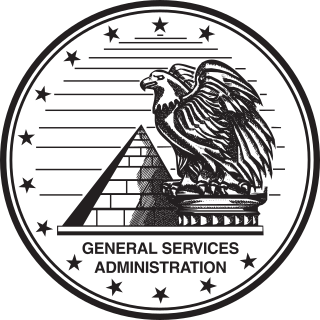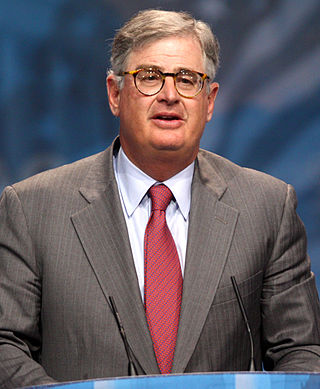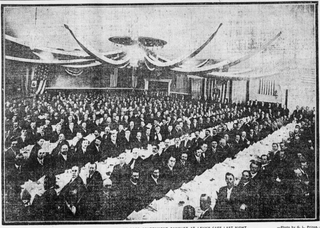
The Executive Office of the President of the United States (EOP) comprises the offices and agencies that support the work of the president at the center of the executive branch of the United States federal government. The office consists of several offices and agencies, such as the White House Office, the National Security Council, Homeland Security Council, Office of Management and Budget, council of Economic Advisers, and others. The Eisenhower Executive Office Building houses most staff.
Chief information officer (CIO), chief digital information officer (CDIO) or information technology (IT) director, is a job title commonly given to the most senior executive in an enterprise who works with information technology and computer systems, in order to support enterprise goals.

The General Services Administration (GSA) is an independent agency of the United States government established in 1949 to help manage and support the basic functioning of federal agencies. GSA supplies products and communications for U.S. government offices, provides transportation and office space to federal employees, and develops government-wide cost-minimizing policies and other management tasks.

Samuel J. "Sam" Palmisano is a former president and the eighth chief executive officer of IBM until January 2012. He also served as chairman of the company until October 1, 2012.
Managed services is the practice of outsourcing the responsibility for maintaining, and anticipating need for, a range of processes and functions, ostensibly for the purpose of improved operations and reduced budgetary expenditures through the reduction of directly-employed staff. It is an alternative to the break/fix or on-demand outsourcing model where the service provider performs on-demand services and bills the customer only for the work done. The external organization is referred to as a managed service(s) provider (MSP).
In the United States, a presidential commission is a special task force ordained by the president to complete a specific, special investigation or research. They are often quasi-judicial in nature; that is, they include public or in-camera hearings.

CGI Inc. is a Canadian multinational information technology consulting and Software Development company headquartered in Montreal, Quebec, Canada. CGI went public in 1986 with a primary listing on the Toronto Stock Exchange. CGI is also a constituent of the S&P/TSX 60 and has a secondary listing on the New York Stock Exchange.

Alliance Manchester Business School is the business school of the University of Manchester in Manchester, England. It is one of the oldest business schools in the UK, and provides education to undergraduates, postgraduates and executives.
The Philippines' Presidential Management Staff is an agency attached to Malacañang that is tasked to manage the development and formulation of the projects and policies of the Office of the President. Though the PMS is headed by a Secretary, the Secretaries of the Cabinet, Chief of Staff, and Appointments, support the agency. The PMS, the Office of the Appointments Secretary and the newly created Events Management Cluster are under the supervision of the Office of the Special Assistant to the President.
The Office of Energy Efficiency and Renewable Energy (EERE) is an office within the United States Department of Energy. Formed from other energy agencies after the 1973 energy crisis, EERE is led by the Assistant Secretary of Energy Efficiency and Renewable Energy, who is appointed by the president of the United States and confirmed by the U.S. Senate. Alejandro Moreno currently leads the office as the Acting Assistant Secretary.
The Partnership for Public Service is a nonprofit, nonpartisan organization based in Washington, D.C. whose mission is to inspire a new generation of civil servants and to transform the way government works.

Diana Farrell is a banker and political advisor who served until 2021 as the founding President and Chief Executive Officer of the JPMorgan Chase Institute, a think tank. Previously, Ms. Farrell was the Global Head of the McKinsey Center for Government (MCG), providing research, proprietary data, and other tools to support government leaders focused on improving performance. In addition, she was a leader of McKinsey’s global Public Sector Practice, and a member of their Partner Review Committee.

The United States has a history of citizen, nonprofit, and other non-partisan groups advocating good government that reaches back to the late-19th-century municipal-level Progressive Movement and the development of governmental professional associations in the early part of the 20th century, such as the American Public Human Services Association and the International City/County Management Association. Many of these groups had their genesis at the Public Administration Center at 1313 East 60th Street, at the University of Chicago.
The Government Performance Coalition was created in 1999 by a group of organizations and researchers with the goal of presenting the president of the United States, government managers, Congress, the media, and the public views on the improvement of government management. The coalition maintains that it seeks to ensure a continued focus and attention to performance and management issues and to identify existing issues that need new attention, and refine past efforts and highlight related governance policies that affect performance. The Coalition, comprising nearly two dozen organizations, meets regularly in Washington, D.C. to serve as a clearinghouse for its individual members’ respective agendas regarding government management improvement. During presidential election years, the Coalition sponsors events to highlight the importance of good government management issues in the campaign and to prepare materials that would be helpful to the winning candidate’s incoming political appointees.
The Office of Social Innovation and Civic Participation was an office new to the Obama Administration, created within the White House, to catalyze new and innovative ways of encouraging government to do business differently. Its first director was the economist Sonal Shah. The final director was David Wilkinson.

Shelley Hope Metzenbaum is an American nonprofit executive, academic, and former government official specializing in public sector performance management. She was the founding president of the Volcker Alliance and worked in the Office of Management and Budget during the Obama administration. Metzenbaum is a fellow of the National Academy of Public Administration.
Ines Mergel is a full professor of public administration in the department of politics and public administration at the University of Konstanz, Germany. She was previously on the public administration faculty at The Maxwell School of Citizenship and Public Affairs of Syracuse University, where she earned tenure as an associate professor of public administration and international affairs. Mergel is an expert in social media and teaches courses in agile government, digital government, and social media in the public sector.
According to the United States Office of Government Ethics, a political appointee is "any employee who is appointed by the President, the Vice President, or agency head". As of 2016, there were around 4,000 political appointment positions which an incoming administration needs to review, and fill or confirm, of which about 1,200 require Senate confirmation. The White House Presidential Personnel Office (PPO) is one of the offices most responsible for political appointees and for assessing candidates to work at or for the White House.
Rosemary O'Leary is Emerita Distinguished Professor at the Maxwell School of Syracuse University and Emerita Distinguished Professor at the University of Kansas. Her research focuses on public management, collaboration, conflict resolution, environmental and natural resources management, and public law. She is most acknowledged for her scholarship exploring dissent in public organizations, collaboration to improve public service, and the impact of courts on public administration.

The Office of American Innovation (OAI) was an office within the White House Office that existed from 2017 until 2021 during the Trump administration. Under Jared Kushner, The office's purpose was to be the White House's main point of contact for the American tech industry as part of an effort to reform the federal bureaucracy by applying lessons from the business world.









